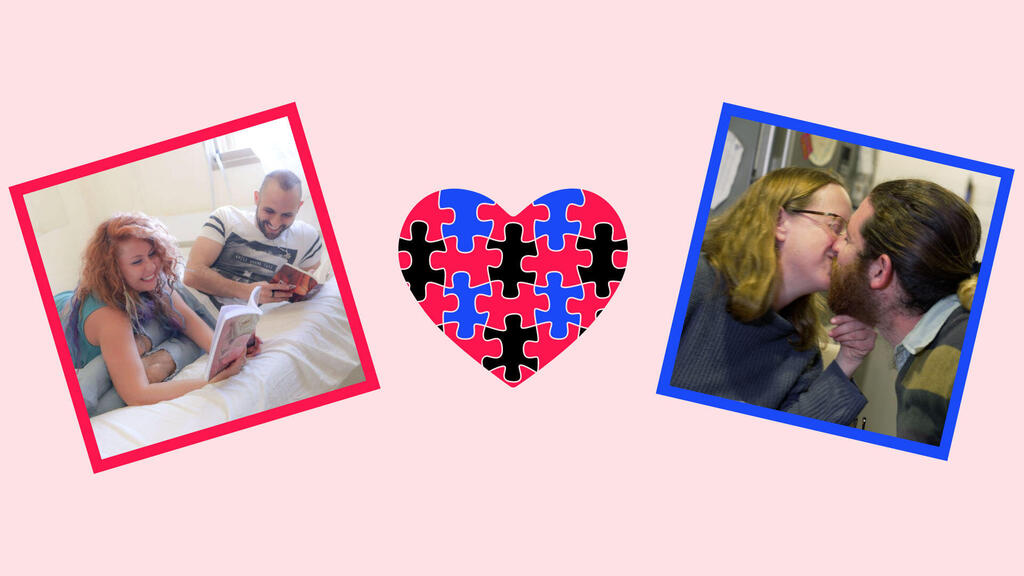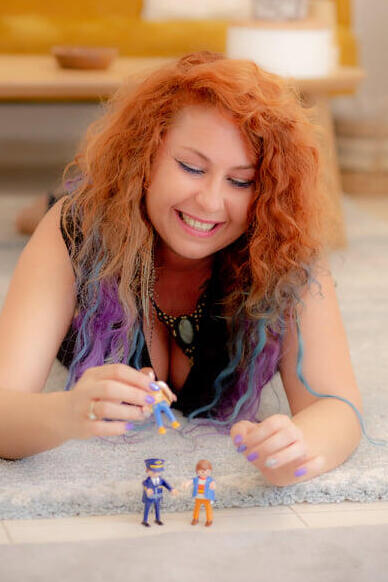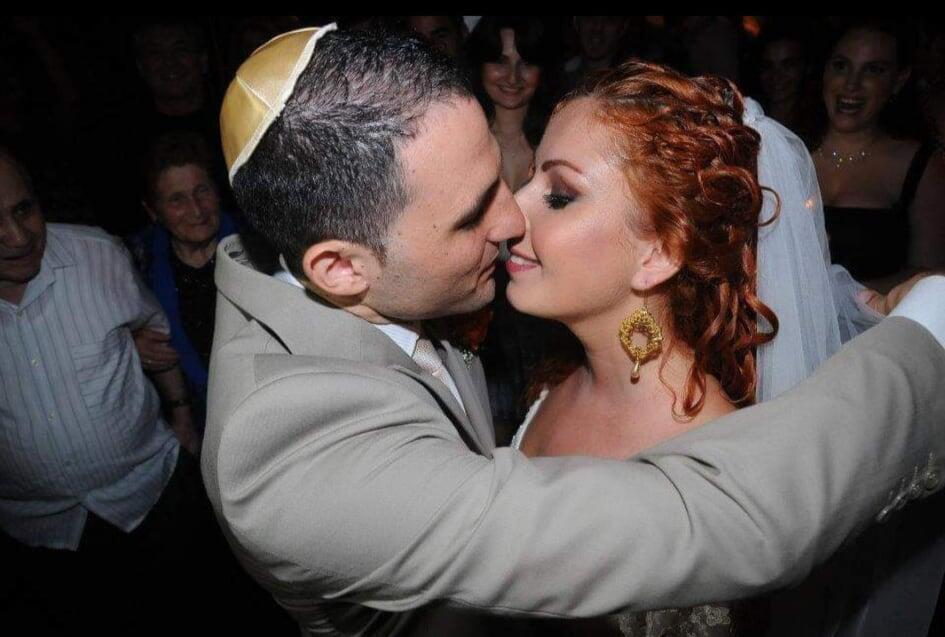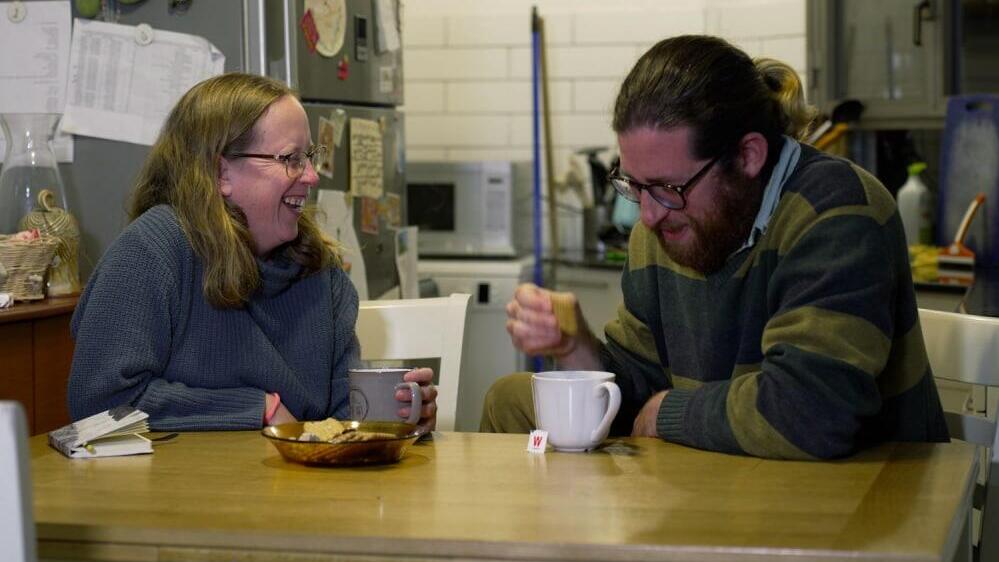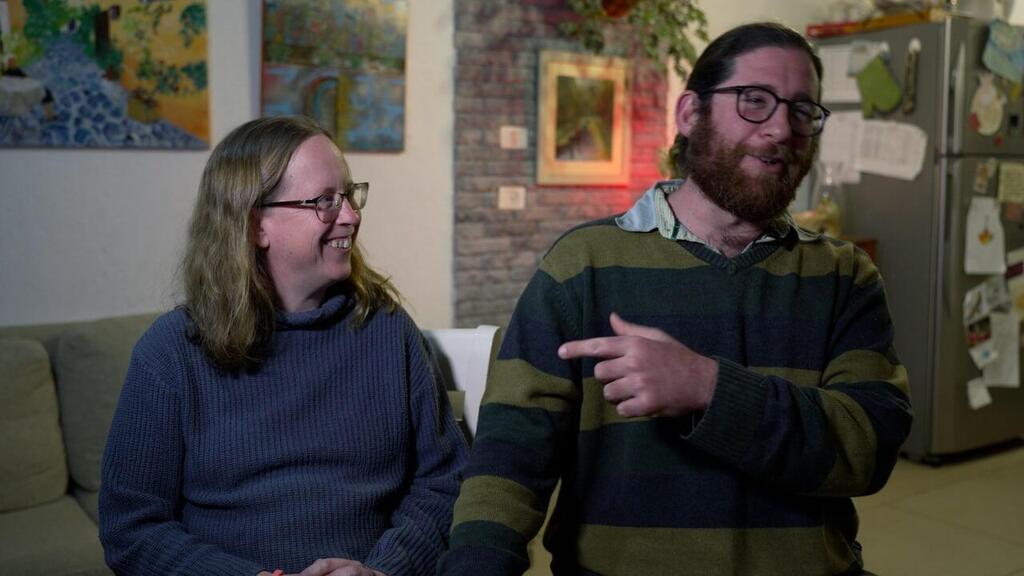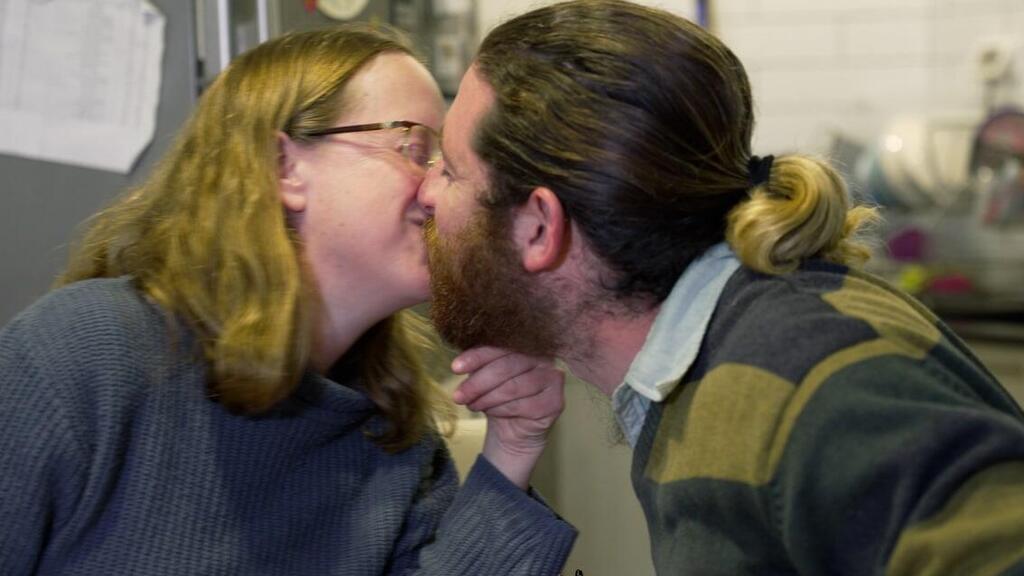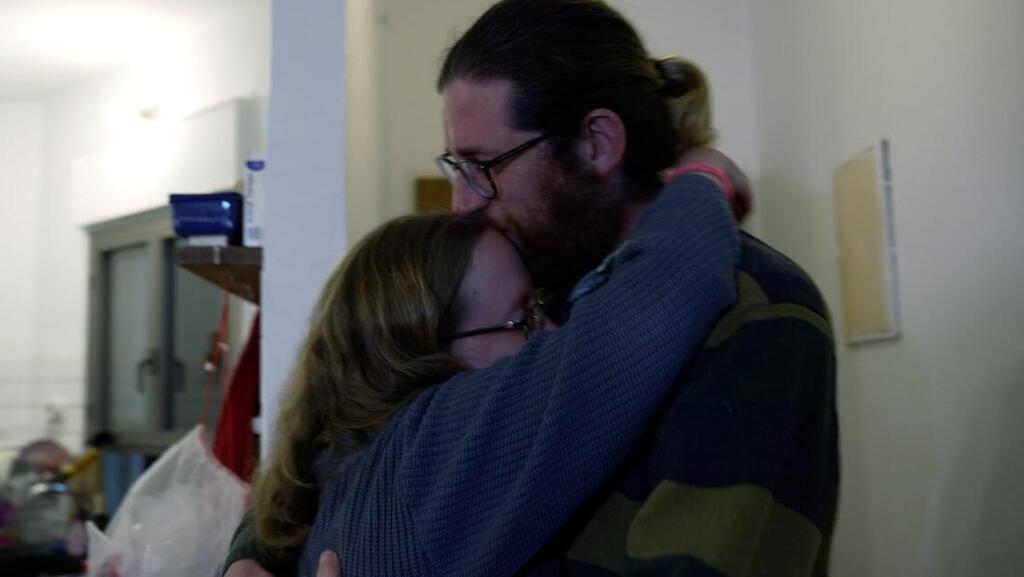Getting your Trinity Audio player ready...
"After nine months, when I ballooned and gave life to a child, I felt I'd lost my sexuality and femininity," says Keren, 39. "I set out on a journey in search what I'd lost in childbirth." She didn't like what she found.
"I realized that what I was looking for didn't involve being with the one same man for the rest of my life." It took time for Shavit to get used to the idea.
Keren started researching polyamory online. "I suddenly discovered that there was such a thing as polyamory, whereby being married, I could go out on dates, feel excited and fall in love – I could have my cake and eat it," she says with a smile.
Shavit, 37, sensing changes in Keren, told himself that this was a passing phase of post-natal depression. "I remember her feeling that something was missing. Things weren't right for about two years. She was looking everywhere for some kind of freedom. She started writing Facebook posts, expressing support in non-monogamy. Anyone reading these postings assumed that we were in an open relationship and I wasn't there, not even in my mind."
Did it make you angry that she was giving the impression that you had opened up the relationship?
"Very much so. I asked her to remove the Facebook posts and I didn't ask nicely," he admits. "I now understand that for quite a long time, I'd been feeling everything that Keren was talking about. I’m glad to say that's not where I am now, but at the time it was the cause of a lot of friction between us."
Tell us a little about the process you went through
At the time, the idea of an open relationship made me very angry. It's very hard for a man to think that he's not enough. We live in a culture that tells us that one partner should provide everything that the other needs, but a person can't be a best friend, a lover, a provider, a great dresser and a wonderful listener. I didn't understand this at the time. I thought Keren must be interested in another man who can do all of these things better than I can."
As time went on, they danced less and became, in Keren's words, "couch potatoes" ending the day, exhausted, sprawled out on the on the sofa.
Keren decided it was time to get back onto the dancefloor.
"I discovered a really sexy new dance called 'Kizumba.'" She started attending Kizumba festivals all over the world where she was surrounded by African men who reignited a spark within her. "These pictures appeared all over my Facebook feed and my mother-in-law was sure she was getting an Angolan grandson. Kizumba released a lot of passion for me. I thought that would be enough. At some stage, I realized it wasn't."
She started seeing herself as a sexual object, or as she puts it: "I wanted men to really want to bang me - that walking down the road, I'd be the sexiest thing ever. I didn't have anyone in particular in mind. I just wanted everything I saw."
Shavit thought they were heading for divorce, but he then listened to a podcast by a swinger couple who meet up with other couples for partner-swapping. "I listened and it sounded that having these very emotionally charged adventures was very romantic. I was on my way to my military reserve duty when I sent Keren a message saying that maybe this is what I'd like to do."
The initial open-relationship experiences were conducted under strict rules. They started going out on double-dates with other couples, ending up in bed together. "It was like singles dating but you know for sure that no one's going home alone."
Although promising at the outset, Keren and Shavit soon identified the flaw in the swinger model in that not everyone is attracted to everyone, and the meetings were often rather superficial and framed in whether or not they would be having sex.
Keren was looking for both physical and emotional connections. "I realized that I wanted to fall in love. This startled Shavit. "He thought that by opening up to the swinger lifestyle, he could control both my emotions and his own. Swinging is very much about the sex and they have rules like, "You're not allowed to fall in love," which leads to a lot of cheating in an environment which is supposed to be open. In reality, you can't control your emotions or anyone else's."
Ahead of an overseas work trip, Keren told Shavit that he could do whatever he wanted over there. He thought, "hey, great". Keren then asked what she was allowed to do. He said she couldn't be with anyone new, but rather only with men she'd been with before. "I brought them all in. I thought to myself: I've got five days; I’m making the most of it!" she says.
Shavit once vetoed one of the men Keren was seeing. She took full advantage of the grey area of this veto and met up with him anyway. "Keren told me she'd been with the guy I'd vetoed. I felt betrayed. Although what she did was technically within the rules, it's precisely where the rules aren't clear, that one partner convinces themselves that what they're doing is OK."
You'd think that Shavit would have ended the relationship at this stage – but the very opposite was the case. "After feeling angry and betrayed, I decided I didn't want any more rules or boundaries. I told Keren that she could be with whoever she wanted and that she can fall in love. He said he felt he'd been behaving like a policeman, full of anger and jealousy, and that it was tearing him apart.
This proved surprisingly positive. "The moment I released Keren from her cage, she calmed down. There was no cage to break out of. She no longer felt her wings were being clipped."
Didn't you think it would break you?
"Polyamory is definitely playing with fire. It's for pyromaniacs. It’s right for people who constantly need to feel strong emotions. You think it's all good, that you have a husband and a boyfriend, and then the boyfriend's wife shuts it all down."
Shavit is a software developer, while Keren is a clinical drama therapist and an alternative sex therapist. She treats lots of couples in open relationships. In recent years, she says that 70% of her patients have come to her to open up their relationships. She also treats "throuples," a romantic relationship between three people, in crisis.
As COVID-19 spread, Keren and Shavit opted for a change of scenery, relocating to Thailand. "We said that we'd do second lockdown with beautiful sunsets." Keren continues to treat the ex-pat, tourist and émigré community in Copen Gan.
She says that the diverse nature of this community helps them learn about attitudes to sex in different cultures. She assesses that for Israelis "men are hungry for sex and women need to hide their sexuality. In Sweden, for example, there is no hunger for sex because sexuality isn't an issue. There's no shame around it. Sex is as normal as eating dinner."
From the tranquility of Copan Gan, during our Zoom interview, touching and giggling, the couple look happy. "We're now in a very good place, even conferring about our other love interests," Keren says.
A flying visit from Keren's mother-in-law interrupted this serenity.
"We were sitting having coffee and Shavit came in from a night with his lover. Shavit and I talked about it and I gave Shavit some advice on how to behave with her, and my mother-in-law lost it. She didn't take it well at all," Keren says.
"It took my mother coming here to Thailand to see that I'm happy. My family appreciate that, so as not to lose Keren, I have given up my own values and principals."
Keren's explains that her family also have trouble accepting the situation. "My mother knows but turns a blind eye, and has instructed me not to tell my father because she doesn't want him having a heart attack." Within the nuclear family however, there are no secrets. Their son knows that both his parents have girlfriends and boyfriends.
"In Israel, there's a lot of pressure around being a parent," Keren says. "A mother is expected to give up on herself and her own needs and if her children are happy, she'll be happy. A few days ago, our son Meitar said, "Dad, I like it that you love yourself, because if you love yourself, I love myself." A dramatic example, Keren believes, of what happens when children grow up with parents who haven't given up on themselves.
Do you have any tips of people considering an open relationship?
Shavit: "Get professional guidance. The chances of it working are much higher if accompanied by ploy-friendly guidance."
Keren: "You should draw up a contract to understand which are fixed boundaries and which are likely to soften over time. It's important to know how to communicate because relationships that don't have communication are likely to be very painful. Also, it's not right for everyone. It's right for people with a very high sense of self worth, which is not contingent on their partner, and those who have a full life with friends, hobbies and work that they love."
In contrast to the Cohen-Riefmans, Noam Davidovich and Dafna Tadmor's relationship has been open from the outset. They live in separate apartments in Tivon in the north of Israel. Noam is a single 29-year-old. Dafna is a 42-year-old divorced mother to of two.
"After I got divorced, I rejected the idea of marriage, being part of a couple and living together. My relationship with Noam is one of friendship, which is also a couple partnership." Noam agrees, and has also put aside the normative concept of "what's being a couple, and how it's supposed to work".
"The moment I put aside the conventional idea of being part of couple, I understood that I can go out with someone older than myself who lives far away," he says.
"If I was looking for 'the one,' I don't think I'd have stuck around because she lived far from me and we have a significant age gap. But I'm not looking for the one, so this relationship happened. We've been together for just over three years and it works well for us. It’s a wonderful love, which couldn't work any other way."
Despite his youth, Noam has been living as a polyamorist for seven years. They met on a polyamorist Facebook group. Freshly divorced, wanting to explore and meet people, Dafna joined the non-monogamic dating group. She wrote a cute, witty post, which caught Noam's attention. He started private message her. Dafna was surprised that a young guy living in Tel Aviv plucked up such romantic bravado and immediately agreed to meet him.
At the beginning of their relationship, Noam would take the bus regularly to Tivon to visit Dafna.
Noam enthusiastically recalls: "The famous 826 bus... I'd come up every week and usually stay over. At some stage, I realized that the journey was really long. About six months later, I moved to Tivon, but we don't live together in the same apartment."
Both Noam and Dafna have relationships on the side. Noam has two more relationships and Dafna has one.
There are all sorts of polyamorous couples who define primary and secondary couple-relationships. How does it work with you?
Dafna: "I'd say it's like that a bit, even if we haven't defined it as such."
Noam: "This is the longest and most meaningful relationship for both of us. We don't have vetoes on other relationships. For us it's flexible, fluid with no hierarchical definitions of primary and other relationships."
How have the children responded to the relationship, to this unfamiliar lifestyle?
"At the beginning, it troubled my eldest daughter. It was soon after the split from her father, so Noam and I slowed things down. Two months into the relationship, I realized that I wanted to meet her children. I wanted to tick it off for myself to show that this was real."
Do you children know that you're in relationships with two men?
Dafna: "The children know. They were six and nine when I met Noam. It felt like a good age to tell them. I just told my daughter that there's such a thing as polyamory and people who think that a person can have a few partners and that's cool. Squinting, my daughter asked "a few partners?" I think it would be harder to explain it to her now that she's twelve. Now, my elder daughter is very fond of both Noam and my other partner.
"I'm good at relationships," Noam says laughingly. "I was good at monogamous relationships. I didn't choose polyamory because monogamy wasn't working for me, but rather because it was, so I wondered what else could work for me. At some stage, when I was in a very stable relationship, the subject came up. I gradually realized that this is how I want to live my life."
This realization was deeper and stronger for Dafna. "When I first heard about polyamory, it felt like some kind of revelation. Suddenly things became clear for me," she says. "I once had a boyfriend and I fell in love with someone else and I felt that it meant that the love I had with my boyfriend wasn't strong enough, and then suddenly I understood that maybe it's okay to fall in love with more than one person."
Although Dafna began feeling this while still married, she only decided exploring the lifestyle after her divorce. Today, three years into polyamory she can't comprehend how she'd been monogamous until now. "People talk about pros and cons, but I don't see any cons to my situation. Why would I put restrictions on passion? It drives me crazy."
"We're not trying to talk anyone into polyamory," Noam adds. "It has both advantages and disadvantages: jealousy, arguments, friction and more people with their own feelings. It can be very complicated. At the beginning it's very exciting to be on the receiving end of all this goodness, falling in love, sex for the first time with a new partner, but people generally calm down at some stage."
You say you don't have rules about what's allowed and what isn't
"That's right. We just know each other's vulnerabilities. We're very good at listening to each other."
Although they don't have rules, they're still careful. "There are some things which I think would still upset him. This evening for example, I’m meeting up with my other boyfriend. I was still a bit embarrassed to tell Noam that after this interview I need to go to meet my boyfriend," she says demurely, reciprocated with a loving smile from Noam.
They hold hands throughout the interview, lovingly smiling, regailing romantic successes and failures with no sense of guilt or shame. "I hit on someone the other day and he turned me down," Dafna says. "He turned me down very nicely, but it was still a rejection, so I needed to tell Noam."
Noam, how do you take this? Aren't you jealous?
"Compared to other polyamorists, I can be very jealous. Even when she told me about falling in love with this guy who turned her down, I felt a bit hurt, but throughout life, you're going to feel jealous or angry, or worse. You just have to make sure these feeling don't dictate your life."
Dafna: "There are a lot of polyamorists who are very jealous and it creates ill feeling, but it's not like that for me. For me, it's as if he told me he'd found a good job or that he saw a great movie or had some other wonderful experience. It makes me happy."
Dafna is a technical writer for a high-tech company. She writes, sings and plays music. Noam a circus artist and a clown.
Noam compares circus performance to multiple relationships: "I can juggle relationships. Like with juggling balls, once I have full control of one ball, I can include more balls and rings while walking a tightrope, and then jump through hoops," he says, smiling.
"But all of this is assuming I can hold one ball, because if I can't hold one relationship, if I can't communicate, if I can't be attentive and listen to my partner, so I'm not sure polyamory would be the solution for me."
Do you think you'll ever go back to monogamy?
"This question comes up a lot," says Noam. "People ask me what would happen if I were to meet the one, who's perfect for me on all fronts and I'd want to be with her and she'd want to be with me. So, I believe that the woman of my life who'll captivate my world who'll be right for me on all fronts would be the woman who respects and accepts my freedom and I'd respect hers. Otherwise, she wouldn't really love me. I believe we gauge the quality of a relationship by how much we support each other, how much we pull and how much we let go."
Do you think you live a lifestyle which is easily judged by society?
Dafna: "Definitely. I find being judged is very hard. I don't like the feeling that I'm not doing the right thing. It drives me insane. People say it's Sodom and Gomorrah, that's there's something wrong with it, that it's immoral or that it harms the children. They might also say that it's not truly love - if you also love someone else. Hearing these things is very hurtful."
Why is it so hard for people to understand?
Noam: "Part of it is that once people say it's legitimate, they might also want it, and if they're in a monogamic relationship with a wife, children and a dog, tearing that apart would be a tragedy. I think that's why people automatically say it's not okay, that it's terrible. Again, we're not trying to win anyone over with our lifestyle."
Dafna: "There's a meme going around the Internet reading: 'What my friends think polyamory looks like' and you see orgies with people all over each other, followed by a picture of what polyamory really looks like, which is lots of people having relationship conversations."


